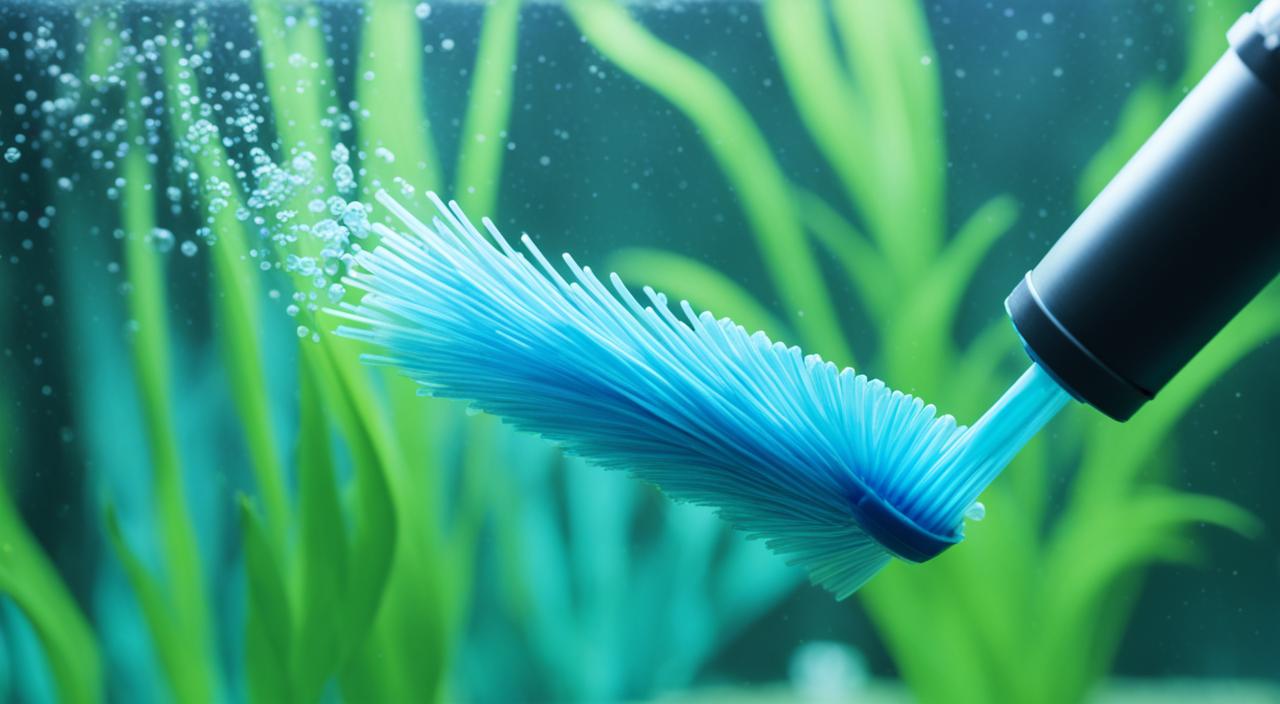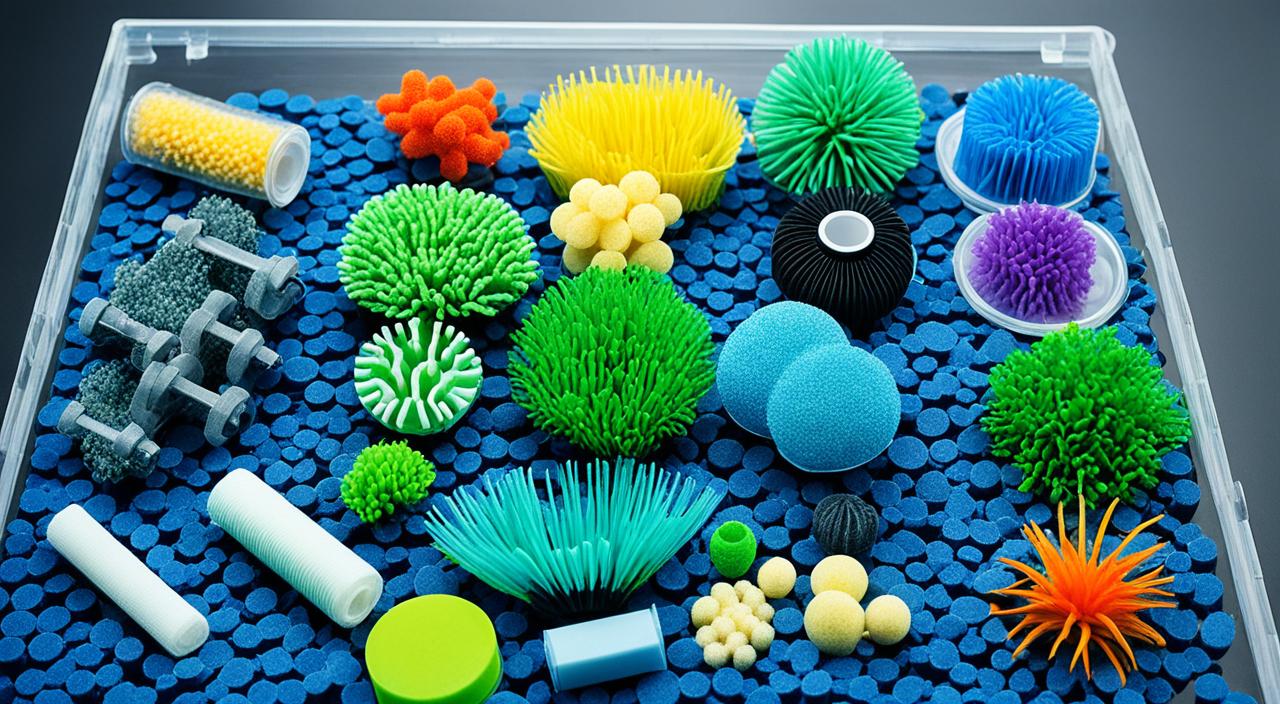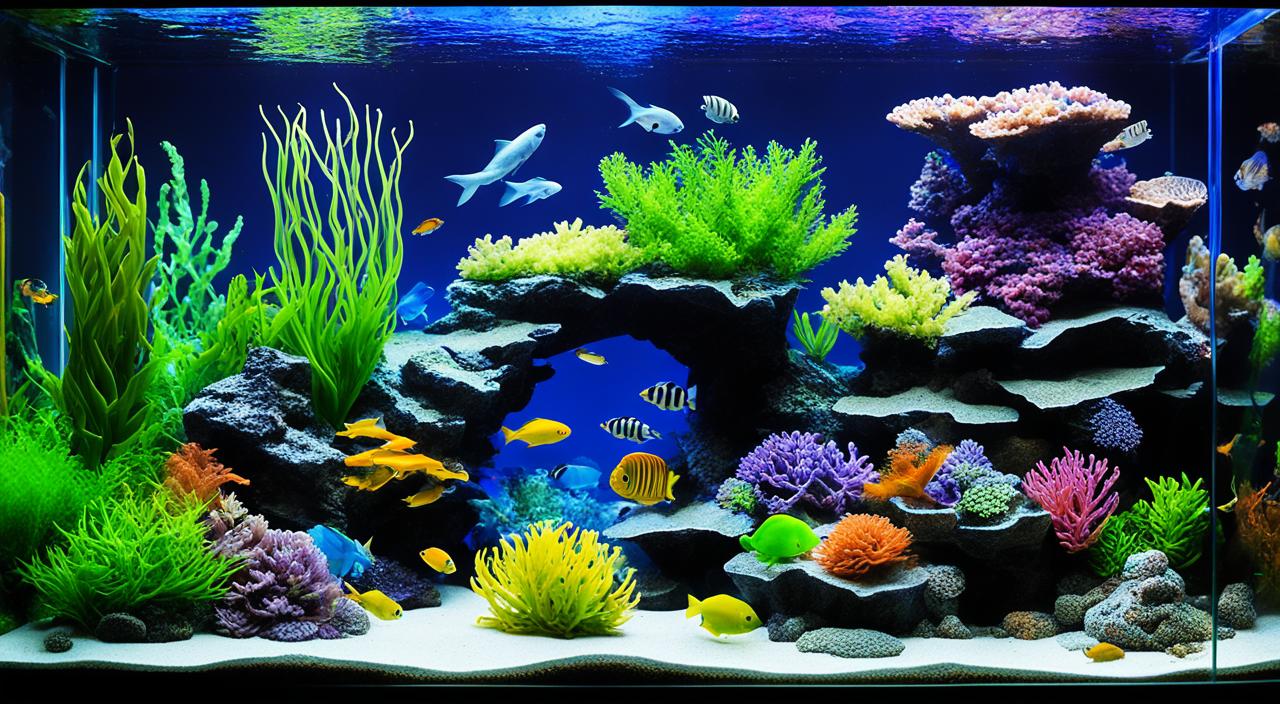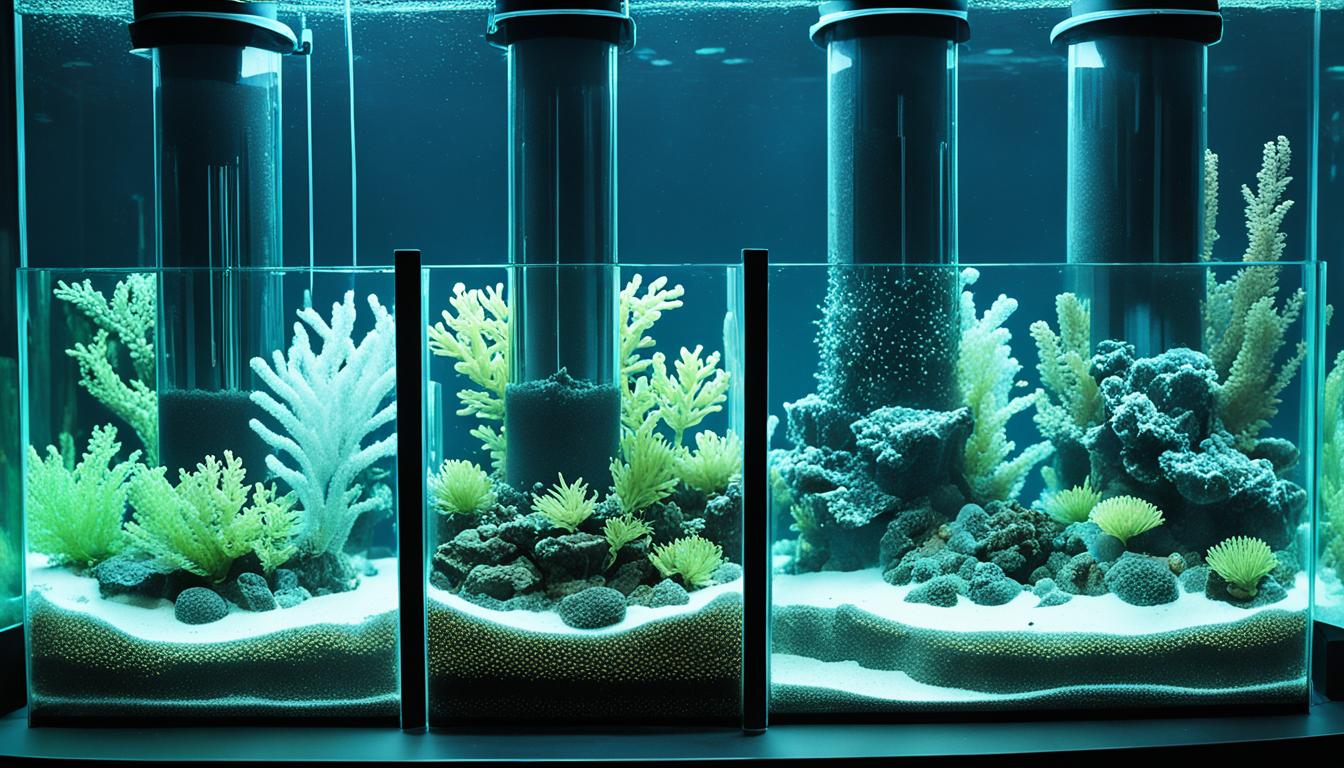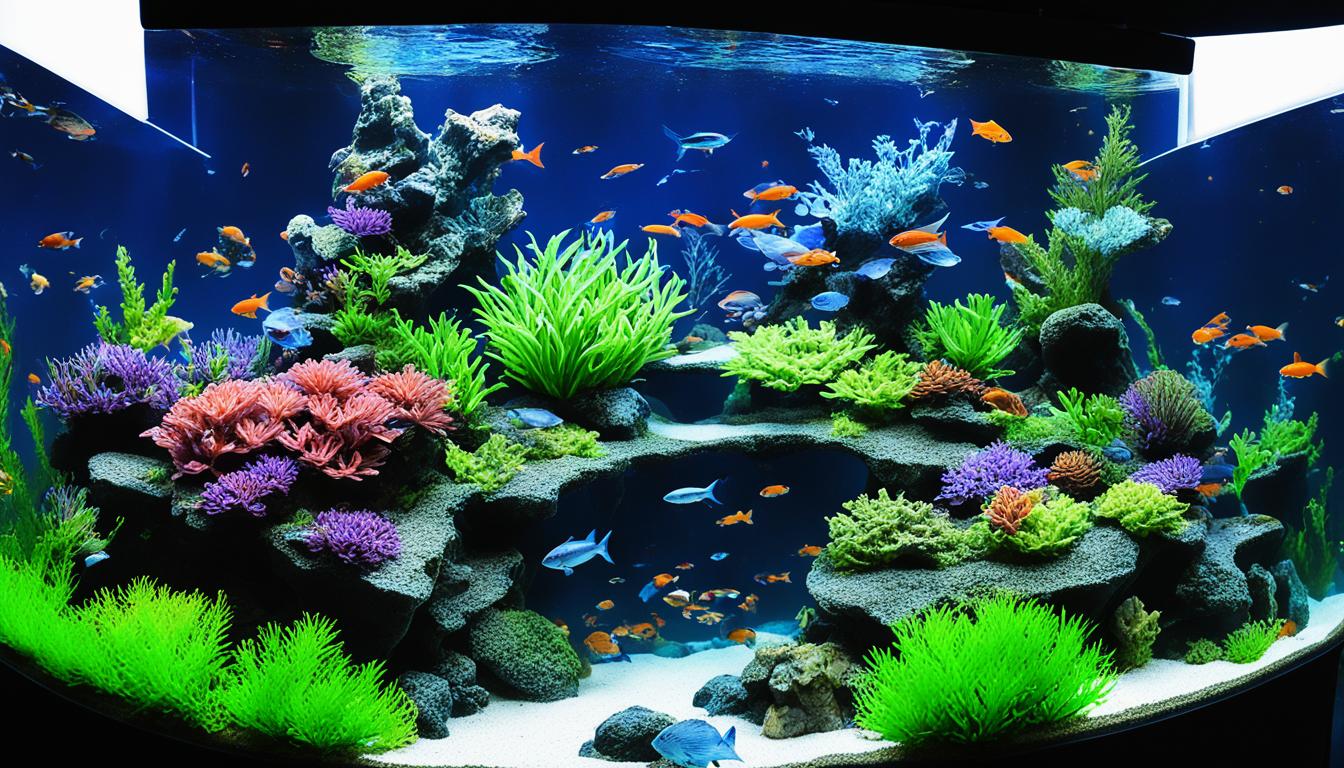A regular maintenance schedule is essential for keeping your aquarium clean and ensuring the health and well-being of your aquatic friends. One crucial aspect of maintenance is taking care of your aquarium filter. The filter is like the lifeline of your tank, responsible for removing physical and chemical waste and maintaining water quality. Your aquarium can suffer from poor water conditions without regular filter maintenance, potentially harming your fish and plants.
Regularly scheduled maintenance helps to keep your filter operating optimally and extends its lifespan. By dedicating time to filter maintenance, you are investing in the long-term success of your aquarium.
Key Takeaways:
- Aquarium filter maintenance is crucial for a healthy aquatic environment.
- Regular maintenance ensures optimal filter performance and prevents water quality issues.
- Filter maintenance contributes to the overall balance and well-being of your aquarium.
- Neglecting filter maintenance can lead to poor water conditions and harm fish and plants.
- Investing time in filter maintenance will save you from potential problems in the future.
- The Essentials of Robust Filter Performance
- Creating a Customized Maintenance Schedule
- The Importance of Regular Filter Maintenance
- Uncovering the Hidden Dangers of Neglect
- Step-by-Step Guide to Effective Filter Cleaning
- Ensuring Long-Term Care with Replacement Parts and Professional Services
- FAQ
- Source Links
The Essentials of Robust Filter Performance
The Role of Mechanical and Biological Filtration
Mechanical filtration is an essential component of maintaining a healthy aquarium. It involves the removal of physical debris and waste particles from the water using filter media, such as foam or filter pads. This process helps to maintain water clarity and prevents harmful substances from accumulating in the tank.
Biological filtration is another crucial aspect of filter performance. It relies on the growth of beneficial bacteria that colonize the filter media. These bacteria break down harmful ammonia and nitrites into less toxic nitrates, ensuring a healthy ecosystem for aquatic pets.
Optimizing Filter Efficiency for a Balanced Ecosystem
Regular maintenance is necessary to ensure optimal filter performance. Cleaning the filter and ensuring proper water flow are vital to maximizing efficiency. Regular maintenance helps prevent clogging and ensures the filter can effectively remove waste from the water.
Filter Media Replacement: Timing and Tips
Filter media replacement is essential for maintaining a balanced and healthy aquarium. It is recommended to follow the manufacturer’s recommendations for replacing filter media. However, you should also be observant and replace the media when it becomes clogged or ineffective in removing waste particles.
Proper timing and tips are crucial when replacing filter media. This helps maintain a balanced ecosystem and ensures your aquarium remains healthy. Pay attention to the quality and lifespan of the media, as well as any signs of reduced efficiency in the filtration process.
Creating a Customized Maintenance Schedule
Creating a customized maintenance schedule for your aquarium filter is essential for staying on top of regular maintenance tasks. Establishing a personalized plan ensures your filter functions optimally and your aquarium remains healthy. When developing your maintenance schedule, consider the size of your tank, the type of filter you have installed, and the specific needs of your fish and plants.
Determine how often you need to perform tasks such as cleaning the filter, replacing filter media, and testing water parameters. Each of these tasks plays a crucial role in maintaining the cleanliness and balance of your aquarium environment. Regular cleaning prevents the filter from becoming clogged and effectively removes physical and chemical waste from the water.
Following the manufacturer’s recommendations or replacing the media when it becomes clogged or less effective is crucial regarding filter media replacement. The frequency of media replacement varies depending on factors such as the type of media used and the level of waste accumulation in your tank. By adhering to a consistent replacement schedule, you can optimize the performance and efficiency of your filter.
Testing water parameters, such as pH, ammonia, nitrite, and nitrate levels, is essential to maintaining a healthy aquarium. The frequency of water testing varies depending on factors such as the size of your tank, the number and species of fish, and the overall stability of your aquatic ecosystem. Regular testing allows you to identify potential issues and take prompt corrective actions to maintain optimal water quality.
In conclusion, creating a personalized maintenance plan for your aquarium filter ensures you stay on top of essential maintenance tasks. By considering your tank’s specific needs and following a consistent schedule, you can optimize your filter’s performance and promote a healthy, thriving aquarium.
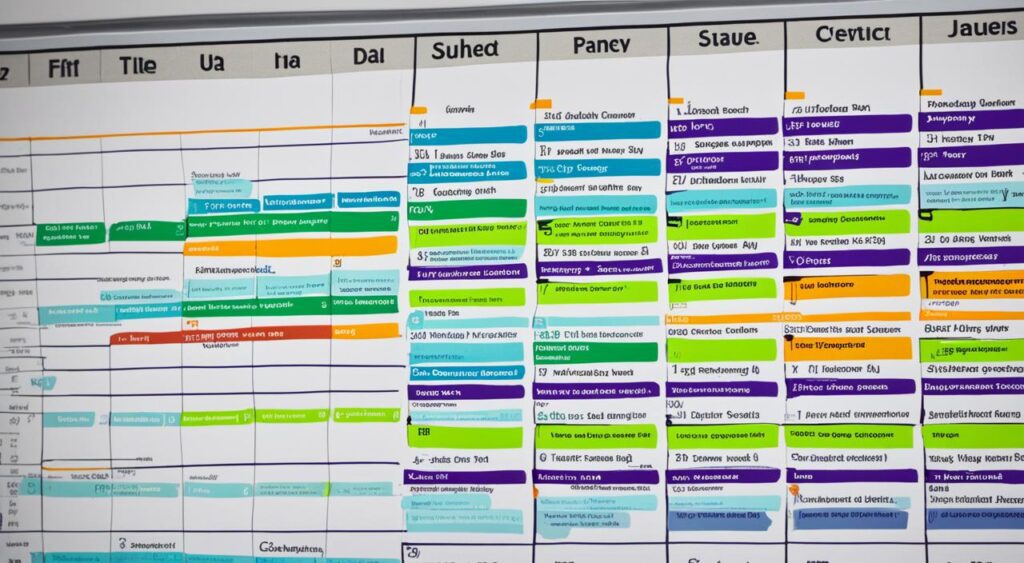
The Importance of Regular Filter Maintenance
Regular filter maintenance is essential for a healthy and thriving aquarium. Neglecting this basic task can lead to various problems, including algae overgrowth, poor water quality, and common filter issues. You can prevent these problems by prioritising regular maintenance and maintaining a balanced and vibrant aquatic environment.
Proactive Measures to Prevent Algae Overgrowth
One common issue that aquarium owners face is algae overgrowth. Algae can quickly multiply and cover the walls, decorations, and even plants in your tank, making it aesthetically unappealing and potentially harmful to the health of your fish and plants. To prevent algae overgrowth, it is crucial to take proactive measures:
- Regularly clean the filter media to remove excess nutrients contributing to algae growth.
- Consider using algae control products or additives specifically designed to inhibit algae growth.
- Ensure proper water flow by checking for any blockages or poor circulation that can promote algae growth.
These proactive measures can keep algae at bay and maintain a clean and visually pleasing aquarium.
Water Testing: Vital Parameters to Monitor
Monitoring water parameters is an essential part of maintaining a healthy aquarium. Regular water testing lets you identify imbalances or abnormalities in your tank’s water chemistry. The following parameters should be monitored:
- pH level: pH determines the acidity or alkalinity of the water and plays a crucial role in the overall health of your fish and plants.
- Ammonia and nitrite levels: High ammonia and nitrites can be toxic to aquatic life and indicate poor water quality.
- Nitrate level: While nitrates are less harmful than ammonia and nitrites, high levels can still negatively impact fish health if not kept in check.
Regular water testing allows you to take prompt corrective action to maintain optimal water quality and prevent potential harm to your aquatic inhabitants.
Troubleshooting Common Filter Issues
Filters can sometimes experience issues that affect their performance and efficiency. It is crucial to quickly troubleshoot and address these common filter problems to ensure proper filtration and maintain a healthy aquarium:
- Filter leaks: Inspect the seals and connections for any signs of leakage and address them promptly to prevent water damage and inefficiency.
- Reduced water flow: Check for blockages or obstructions that impede water flow and clean or replace the necessary components.
- Unusual noise: Unusual noises coming from the filter can indicate mechanical issues. Investigate the source of the noise and resolve it to prevent further damage.
By troubleshooting and addressing these common filter issues, you can ensure that your filter functions optimally provides efficient filtration, and maintains a healthy aquatic environment for your fish and plants.
Uncovering the Hidden Dangers of Neglect
Neglecting regular filter maintenance can have severe consequences for your aquarium. Poor water quality can lead to fish stress, disease outbreaks, and even fish loss. Additionally, neglected filters may fail to effectively remove physical and chemical waste, increasing ammonia and nitrite levels in the tank. Understanding the hidden dangers of neglect and prioritising regular maintenance is essential to ensure a healthy and thriving aquarium.
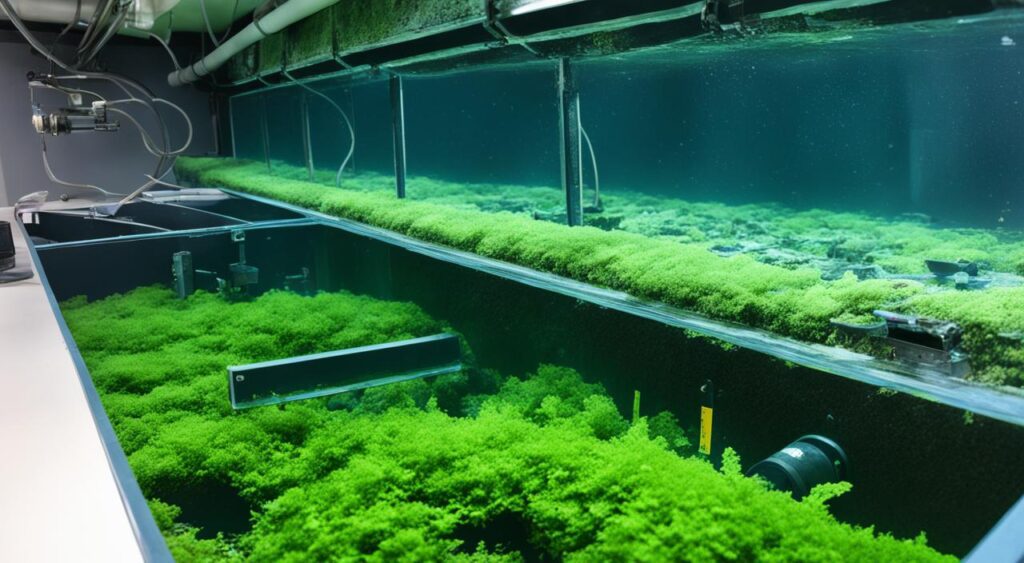
When aquarium filters are not properly maintained, the consequences can be detrimental to the overall health of your aquatic environment. Neglected filter risks include:
- Poor Water Quality: Neglected filters cannot effectively remove physical debris and chemical waste from the water. This can result in a buildup of harmful substances, such as ammonia and nitrites, leading to stress and disease in fish.
- Increased Ammonia and Nitrite Levels: Without regular maintenance, filters can become clogged and less efficient in removing ammonia and nitrites. High levels of these pollutants are toxic to fish and can cause serious health issues.
- Stressed Fish and Disease Outbreaks: Poor water quality and increased ammonia and nitrite levels can create a stressful environment for fish. This weakens their immune system and makes them more susceptible to diseases, leading to potential outbreaks in the aquarium.
- Fish Loss: In extreme cases of neglected filter maintenance, the health of the fish can deteriorate to the point of mortality. Fish loss can occur due to stress, disease, or the inability of the filter to maintain a suitable environment.
By neglecting filter maintenance, you risk compromising your aquarium’s delicate balance. Regular maintenance is crucial for maintaining optimal water quality, supporting the well-being of your fish, and ensuring a thriving aquatic ecosystem.
Step-by-Step Guide to Effective Filter Cleaning
Cleaning your aquarium filter is an essential part of proper maintenance. Regular cleaning ensures the filter’s efficient functioning and contributes to your aquatic environment’s overall health and well-being. Follow this step-by-step guide to effectively clean your filter and maintain a clean and balanced aquarium.
Choosing the Right Cleaning Tools and Techniques
When cleaning your filter, using the right tools and techniques is crucial to avoid damaging the filter or disrupting the biological filtration system. Here are some important considerations:
- Use soft brushes or non-abrasive sponges to clean the various components of the filter.
- Avoid harsh cleaning solutions that harm the filter or the tank’s inhabitants.
- Refer to the manufacturer’s instructions for specific cleaning recommendations based on your filter type.
By choosing the appropriate cleaning tools and techniques, you can ensure that your filter is thoroughly cleaned without compromising its functionality or the well-being of your aquatic life.
Maintaining Biological Filtration During Cleaning
When cleaning your filter, preserving the beneficial bacteria that contribute to biological filtration is essential. These bacteria help break down harmful ammonia and nitrites, maintaining a healthy aquatic environment. Follow these tips to maintain biological filtration during the cleaning process:
- Rinse the filter media in tank rather than tap water to avoid killing off beneficial bacteria.
- Avoid using chemicals or cleaning agents that may harm or disrupt the biological filtration process.
By taking these precautions, you can ensure that your filter maintains its biological filtration capabilities, promoting a balanced ecosystem and the well-being of your fish and plants.
Filter Noise Reduction Strategies for Peaceful Aquariums
Excessive noise from the filter can be disruptive and stressful for the aquatic inhabitants of your tank. To create a peaceful and tranquil aquarium environment, consider the following filter noise reduction strategies:
- Ensure proper placement of the filter to minimize vibrations and noise.
- Add foam padding or insulating materials around the filter to reduce vibration and absorb noise.
- Utilize noise-dampening accessories, such as silencers or diffusers, to reduce filter noise.
Implementing these strategies can create a serene and harmonious atmosphere in your aquarium, allowing your fish and plants to thrive.
Dive Deeper into the World of Aquarium Filtration
Our journey through the fundamentals of aquarium filters is just the beginning. Delve deeper with us as we explore each facet of aquarium filtration in our upcoming series:
- Types of Aquarium Filters: Discover the diverse world of filters and find the perfect match for your aquatic setup.
- The foundation of Filtration: The Three Pillars of Filtration(Biological, Mechanical and Chemical)
- Aquarium Filter Brands: Navigate the seas of options as we review the top brands in the filtration market.
- Aquarium Filter Accessories: Uncover the essential additions that enhance filtration efficiency and effectiveness.
- Aquarium Filters by Tank Type: Learn how to select the ideal filter for your specific tank type, whether freshwater, marine or a specialized setup.
- Aquarium Filter Setup and Usage: Step-by-step guidance on installing your filter and optimizing its performance.
- Aquarium Filter Maintenance: Keep your aquatic environment pristine with our tips on regular filter care and troubleshooting.
- Aquarium Filter Performance: Evaluate filter performance and ensure your aquatic residents thrive in a clean, healthy environment.
- Specialized Aquarium Filters: Explore filters designed for unique challenges, including breeding tanks and heavily planted aquariums.
- Aquarium Filter Sales: Find the best deals and make informed purchases with our buying tips and recommendations.
- Innovations in Aquarium Filters: Stay ahead of the curve with the latest advancements in filtration technology.
Embark on a Clearer Path to Aquatic Excellence
Your quest for the perfect aquatic ecosystem is a journey we’re excited to share. Each article in our series is designed to illuminate, guide, and inspire. Don’t miss out on turning your aquarium into a thriving, vibrant underwater paradise.
Ensuring Long-Term Care with Replacement Parts and Professional Services
Proper aquarium filter maintenance is essential for its long-term care and optimal performance. In order to be prepared for emergencies, keeping a spare parts inventory on hand is recommended. Having spare filter media, O-rings, seals, and other components readily available allows for quick replacements when needed. This proactive approach ensures that your filter can be repaired promptly, minimizing disruptions to your aquarium ecosystem.
Knowing when to consider professional maintenance services is crucial for complex or specialised filters. Professional services provide expertise in maintaining and troubleshooting filters, especially those with advanced features or specific requirements. By leveraging the knowledge and experience of professionals, you can ensure that your filter receives the best care possible, extending its lifespan and optimizing its performance.
Investing in quality filter hygiene pays off in numerous ways. By consistently maintaining and caring for your filter, you promote improved water quality in your aquarium, which directly benefits the health and well-being of your fish and plants. Additionally, proper filter care reduces the stress on your aquatic inhabitants, leading to a more harmonious and vibrant environment. Investing in quality filter maintenance is a worthwhile endeavour that yields a healthier and more thriving aquarium.

